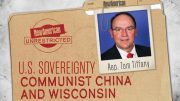On November 10, Senator Rand Paul (shown, R-Ky.) sent a letter to the inspector general of the Federal Reserve setting forth his concerns with attempts by the Fed to hire lobbyists to convince congressmen to vote against a bill recently proposed by Paul to bring transparency to the Fed.
Earlier in November, Senator Paul, one of the fifteen Republicans running for president, introduced the Bring Accountability Now to the Fed Act, one provision of which would forbid the Fed or any of its officials from lobbying.
“The Federal Reserve, as an entity of the government and operating under authority granted by Congress, should not use its funds to lobby members of Congress or influence Congress’s efforts to create a more transparent and fundamentally sound monetary policy,” Paul writes in the letter.
Specifically, Paul wants answers to three questions regarding the Fed and its lobbying activity.
First, how much does the Federal Reserve spend on public relations?
Second, how much does the Federal Reserve spend on lobbying Congress?
And third, how much does the Federal Reserve spend on conferences, travel, or other entertainment?
For the sake of comparison and context, a report published in July 2014 by the Daily Caller revealed that the Obama family has spent over $44 million in taxpayer money on travel and vacations since 2009.
Given that the president is at least in some measure accountable to the people by way of election, one can only imagine how free-spending an unaccountable, unconstitutional group such as the Federal Reserve would be.
The fact is, the Fed is accountable to no one and its activities have never seen the light of day, despite several valiant attempts by Senator Paul, his father, and other constitutionally aware representatives.
In February 2013, Senator Paul offered the Federal Reserve Transparency Act of 2013, also known as “Audit the Fed.” That bill would have eliminated restrictions on Government Accountability Office (GAO) audits of the Federal Reserve. Additionally, it would have specifically granted Congress oversight of the Fed’s credit facilities, securities purchases, and quantitative easing activities.
“The Fed’s operations under a cloak of secrecy have gone on too long and the American people have a right to know what the Federal Reserve is doing with our nation’s money supply,” Paul said in a statement accompanying that bill. “Audit the Fed has significant bipartisan support in Congress and across the country and the time to act on this is now.”
The Senate version of that bill never was allowed to reach a vote on the floor.
A companion bill was offered in the House of Representatives by then-Representative Paul Broun (R-Ga.). Although that bill was approved by the House by a vote of 333-92, it was never taken up by the Senate.
The Senate’s failure to even consider any of these bills to force the Fed’s activities into the light shows that perhaps there needs to be more transparency in the goings on of the Senate itself.
There is an urgent need to educate senators about the damage the Federal Reserve and the shadowy coterie of global bankers who own it have done to the economic wellbeing of the United States.
First, the unelected governors of the unconstitutional central bank have an absolute stranglehold and monopoly over the flow of our nation’s money and credit. Not once since its inception in 1913 has there ever been a thorough audit or an accounting to Congress about its activities.
During its century-long reign over the financial well-being of our country, the Federal Reserve has manipulated our currency until it is nearly worthless. Meanwhile, Congress turns a blind eye and a deaf ear to the crisis and the calls to control it.
The fact is that since that day in 1913, the dollar has lost over 95 percent of its purchasing power. Most, if not all, of this precipitous decline was caused by the monetary policy of the Federal Reserve.
Adding insult to injury, during testimony to Congress in 2009, then-Fed Chairman Ben Bernanke refused to reveal to committee members the names of the institutions that received trillions of dollars in bailout money from the Fed. Later, he told our elected representatives that he would not disclose the identity of the foreign banks that were parties to sweetheart deals with the Federal Reserve.
When it comes to the central bank and its machinations, the fix is in. The Fed — ostensibly a non-profit organization — owns the mint, the money, and sets the terms of the loans it makes to the federal treasury. What’s more, there is no product, there is nothing being loaned other than worthless paper that can never be traded in for anything of value because all that is used to secure the worth of the currency is now owned by the very bankers who control the Federal Reserve.
And the Fed will continue to accumulate power. There is no limit to the lengths global bankers will go to in order to enslave the population of the world. There is no hope of regulating restraint. Power of this magnitude operates beyond the reach of regulations.
Unfortunately — or by design — the Senate refuses to call the Fed to the carpet. Perhaps these lawmakers are worried what might be exposed should the light of inquiry be shown on the Fed and its agents.
It is time for Americans to press their federal lawmakers for an audit of the Fed.
Failing that, however, Senator Paul’s effort to force the inspector general to do his job is at least laudable.
“The Fed has used its immense power to bail out Wall Street and print money to finance our debt. When anyone rises up to challenge them, Fed officials use taxpayer dollars to lobby for more power and against oversight of their activities. It is time for Congress and the American people to say enough is enough,” Senator Paul said when he announced his bill earlier in November.
While Paul’s effort is to be commended, if we are to restore financial vitality to this country, Americans must demand that Congress do more than ask for confessions from the Fed. Congress must immediately revoke the charter that created the Federal Reserve and return all the money it has seized to the people and the market that it has held as indentured servants for over a century.
Photo: AP Images




